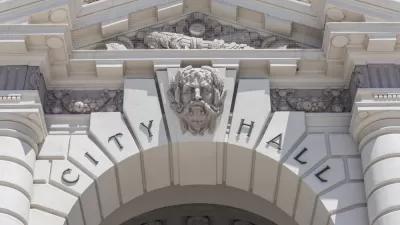"Rethinking Streets in an Era of Driverless Cars" presents ideas about how city planners, policy makers and community residents can begin thinking about street transformation in an AV era.

The next wave of transportation technology is coming quickly—the autonomous vehicle (AV) or driverless car. As a new transportation technology, AVs are likely to disrupt long-established patterns of urban development, transportation choices and the use of streets. This is the moment for all levels of government to revisit the fundamental purposes of transportation, to take stock of our transportation systems and policies, and attempt to do transportation better. In particular, autonomous vehicles present new and unique opportunities for fresh thinking about how streets are used—by whom, how, and to what ends.
This newly released, and highly accessible, paper shows how planners and policymakers can seize the potential of autonomous vehicles to rethink streets and accelerate a transformation of the public right of way to better public use. Autonomous vehicles offer an entry point into society-wide conversations about transportation, the functions of cities, the use of streets, and how all this impacts equity, environment, social cohesion, happiness, economic health, resiliency, and more.
Cities wield the power—most critically, by regulating one of their largest assets, the street—to channel this disruption in support of wider social, environmental and economic goals. The choices that cities make over the coming years will set the terms of the sustainable transportation debate and establish priorities and practices of society for generations to come.
This new report is available as a free download as a part of the Urbanism Next research series. Urbanism Next is an initiative of the University of Oregon's Sustainable Cities Initiative (SCI) that focuses on how autonomous vehicles, e-commerce, and the sharing economy will influence the form and function of cities, or the "secondary effects" of these technologies on how and where we live.
FULL STORY: Rethinking Streets in an Era of Driverless Cars

Planetizen Federal Action Tracker
A weekly monitor of how Trump’s orders and actions are impacting planners and planning in America.

Congressman Proposes Bill to Rename DC Metro “Trump Train”
The Make Autorail Great Again Act would withhold federal funding to the system until the Washington Metropolitan Area Transit Authority (WMATA), rebrands as the Washington Metropolitan Authority for Greater Access (WMAGA).

DARTSpace Platform Streamlines Dallas TOD Application Process
The Dallas transit agency hopes a shorter permitting timeline will boost transit-oriented development around rail stations.

Supreme Court Ruling in Pipeline Case Guts Federal Environmental Law
The decision limits the scope of a federal law that mandates extensive environmental impact reviews of energy, infrastructure, and transportation projects.

Texas State Bills to Defund Dallas Transit Die
DART would have seen a 30% service cut, $230M annual losses had the bills survived.

Bikeshare for the Win: Team Pedals to London Cricket Match, Beats Rivals Stuck in Traffic
While their opponents sat in gridlock, England's national cricket team hopped Lime bikes, riding to a 3-0 victory.
Urban Design for Planners 1: Software Tools
This six-course series explores essential urban design concepts using open source software and equips planners with the tools they need to participate fully in the urban design process.
Planning for Universal Design
Learn the tools for implementing Universal Design in planning regulations.
Roanoke Valley-Alleghany Regional Commission
City of Mt Shasta
City of Camden Redevelopment Agency
City of Astoria
Transportation Research & Education Center (TREC) at Portland State University
US High Speed Rail Association
City of Camden Redevelopment Agency
Municipality of Princeton (NJ)



























